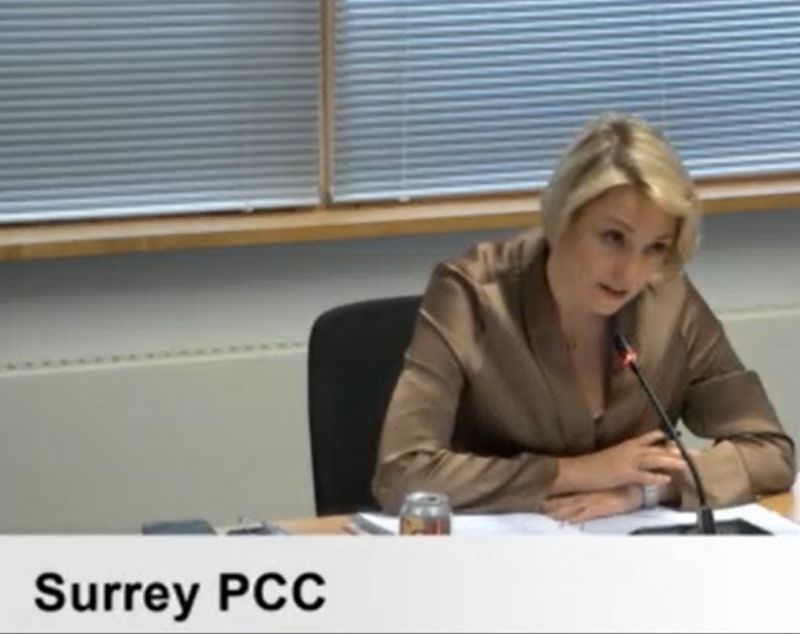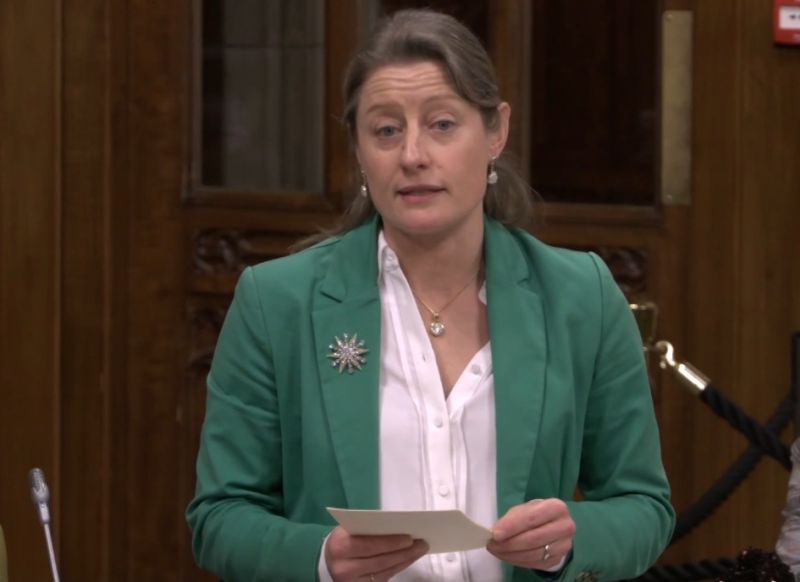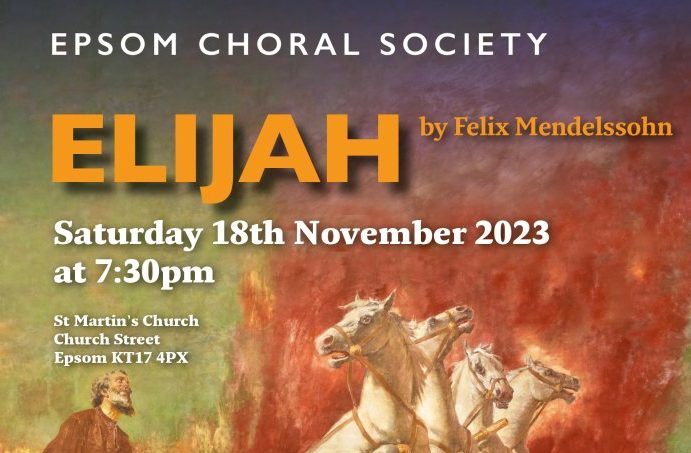Lavish production of Elijah reviewed
Nigel Williams reviews Epsom Choral Society‘s performance on Saturday 18th November of Felix Mendelssohn’s oratorio Elijah staged in the town’s St Martin’s Church.
The Old Testament prophet’s story was lavishly told with five soloists, an orchestra of strings, brass, woodwind, timpani and organ, and a chorus of several dozen well-drilled and responsive singers under conductor Julian Collings.
Your reviewer had attended their open rehearsal early in the term, when Marion Lea was supplying
single-handedly (well, two-handedly) all the orchestra’s notes on the piano and the chorus were learning
how their parts fitted together. In the time since, Epsom Choral Society turned early sketches into a
complete painting. An “iron” sky could be coloured by high woodwind chords, limping string phrases
could suggest Elijah’s weary departure for the wilderness, and ringing timpani and organ chords
underpinned a song of pious thanksgiving for the end of a famine. Felix Mendelssohn knew how to
deploy an orchestra and the best way to appreciate it was to hear it live.
The Choral Society’s task was to project their sound from the tiered staging behind the orchestra and
unfold a series of choruses with very different challenges. In chordal passages they needed to keep in
tune with each other, whereas in complex contrapuntal turn-taking movements the challenge was also
keep up with the tempo and find their entries in among all the other notes. Elijah is also a big sing. It
needs a lot of volume to deliver its full dramatic grandeur. They deliberately avoided over-singing the
afternoon rehearsal, so there was still something in the tank even by the final two choruses, delivering
whirring scale passages as Elijah went by a whirlwind to heaven. Those words ended very loud but
began with some dramatic rapid whispering. Mendelssohn’s style relishes the idea of light “shining forth”.
In one of those contrapuntal passages, the tenors, though fewer in number, still had that luminous quality
more than two hours into the concert.
Before then, we had heard ample demonstrations of prowess from elsewhere in the choir. Not quite as
outnumbered as the tenors, basses had a difficult task to make their entries clear when competing with
organ, timpani and low strings but they were up to it.
Elijah is very much an English piece, written in the tradition of German composers working this side of
the Channel. Mendelssohn was keen to make his lines fit the words of his English translator, William
Bartholomew, and Choral Society made sure we heard them. You don’t often hear the word “laveth” in
song but we heard it on Saturday. The most German-sounding moment came when the Angels’ trio “Lift
thine eyes to the mountains” was sung by the choir sopranos and altos, instantly painting a scene of
alpine villagers, with a lightness of touch that belied words about a foot that shall not be moved. There
were not so many opportunities to show off delicacy and beauty of singing tone. They took that one, and
the serene full-choir chorus that followed, “He, watching over Israel, slumbers not nor sleeps.” I missed
“He that shall endure to the end”, cut for reasons of timing, which I think would have showed them off
well.
Having an orchestra, the English Sinfonietta, and five soloists was a luxury. Treble Brandon McGuinness,
taught singing at Epsom College by Christopher Goldsack, sang a resolute succession of top Gs while
the orchestration changed underneath him. It is worth hearing those notes while they last. I have heard
John Findon (tenor), Elizabeth Findon (soprano) and Judy Brown (mezzo) before and fully understand
why they regularly get invited back. Judy Brown got the show-stopping movement, “O Rest in the Lord”.
She kept it simple, with a voice both unaffected and affecting, offering half reassurance, half lullaby. They
also gave us some delectable ensemble singing in the soprano-mezzo duet “Zion spreadeth her hands”
and quartet “Cast thy burden upon the Lord”.
By far the largest role went to bass James Geidt as the prophet himself. Accustomed to operatic
performance, he learnt much of his part by heart, so when singing he could look to the audience or the other performers. He brought a voice that was rich and treacly and looked the part with a luxuriant Old-
Testament beard. His acting skills led his character from pompous confidence through fear and weariness to final moments of joy.
There was plenty of joy. Epsom Choral Society had learnt their parts well. They sang of rescue,
perseverance and redemption, themes that were joyful enough, but they could also take pleasure in
performing to high standard.
Nigel Williams belonged to St Martin’s Church choir for almost twenty-five years alongside several Choral
Society members, singing second bass and composing a handful of pieces for them to sing. His edition
of Am Himmelsfahrtstage with English translation is available from the Choral Public Domain library.



















